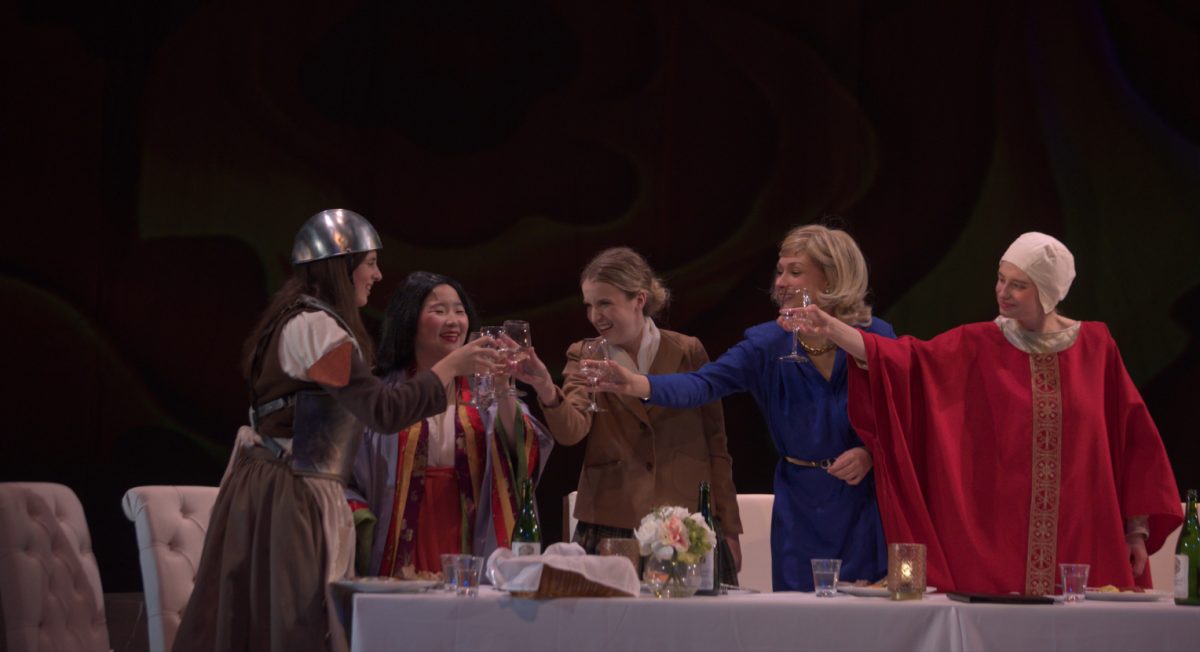
(Catherine Li / Heights Staff)
This weekend, an all-female cast hushed audiences at Robsham Theater with striking and amusing dialogue on gender roles. Easily digestible but still complex, BC Theatre’s rendition of Top Girls provided food for thought on the female experience and how varying socioeconomic factors affect it.
The show, directed by Patricia Riggen, debuted on Thursday and featured a versatile cast, which portrayed a mix of historical and fictional characters.
The show’s first act centers on a lively dinner conversation between several female figures and Marlene (Annabelle Bryant, MCAS ’27), who is celebrating her promotion—she is now managing director of the Top Girls Employment Agency. It soon becomes apparent that there is much more in common between the women than just their British accents.
Within the banter are occasional mentions of their individual hardships. At the end of a discussion about her hidden pregnancy, Pope Joan said, “They took me by the feet and dragged me out of town and stoned me to death.”
Despite gathering to celebrate Marlene’s success, the women end up focusing on the honors and misfortunes of their own lives. Oftentimes talking right over each other, they yearn to share their experiences as wives, mothers, and victims of the patriarchy.
Adventurous Isabella Bird, elegant Lady Nijo, brilliant Pope Joan, tough Dull Gret, and obedient Patient Griselda show the many positions a woman can hold in a society that disregards her worth.
During religious debates, lamentations on motherhood, and depressing recounts of abuse, a single word from Dull Gret or a shockingly self-important comment from Pope Joan could cause the crowd to erupt with laughter.
The chemistry between all of the distinct characters succeeded in both riling up the crowd and provoking thoughtful ideas about the shared pains of womanhood.
After the first act, the story switches to a modern setting, focusing on Angie (Peyton Zaletsky, MCAS ’27), Marlene’s niece and the young daughter of Joyce (Ava Maloco, MCAS ’26).
As Angie’s emotional and mental immaturity becomes increasingly overt, the intense comparison between Marlene and working-class women is emphasized more. Marlene’s steely dedication to success and professionalism often makes her an enemy of women who are confined to less exciting lifestyles.
When Angie surprises Marlene at work, Marlene is again shown to favor her professional role over her family. This constant choice between a struggling, domestic lifestyle and a glamorous career plagues Marlene.
The show comes to its precipice in a heated argument between Marlene and Joyce. The sisters question and criticize each other’s decisions until they are stripped to their most vulnerable states. Through tears and yelling, they reach the sad understanding that they cannot escape the lives they lead or the roles that they must play.
Angie delivers the final words of the show, repeating “frightening” in quiet panic and desperation. When the lights dimmed, an eerie silence filled the theater. The audience was certainly mulling over the abrupt nature of the ending—a conclusion that contained layers of meaning.
As the cast bowed, the audience rose to their feet together, applauding what was a well-executed and heartfelt performance. Through the combination of detailed dialogues and masterful character portrayals, Top Girls showed the strife of womanhood through an accessible lens.